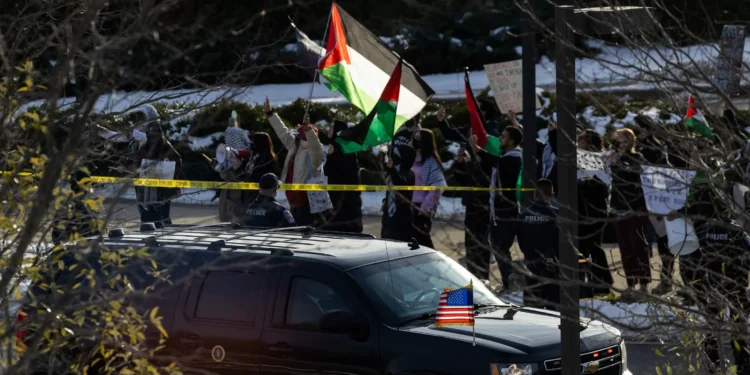George Mason University, a public research university located in Fairfax, Virginia, has recently made headlines for its decision to suspend its Students for Justice in Palestine (SJP) chapter and remove the group’s co-president from their position. This decision has sparked controversy and raised concerns about the university’s commitment to free speech and the rights of student organizations.
The suspension of SJP came after a police raid on the home of two of its members, who were being investigated for alleged involvement in graffiti incidents on campus. The raid was led by the FBI and has been met with criticism from students, faculty, and civil rights organizations. Many have questioned the excessive use of force and the targeting of a specific student group.
SJP is a student-led organization that advocates for justice and human rights for Palestinians. The group has been active on George Mason’s campus for several years, organizing events and raising awareness about the ongoing Israeli-Palestinian conflict. Their work has been met with both support and opposition, but the university has always maintained a stance of allowing free speech and expression for all student groups.
However, the recent events have raised concerns about the university’s commitment to this principle. The suspension of SJP and the removal of its co-president has been seen as a direct attack on the group’s right to free speech and assembly. It has also raised questions about the university’s relationship with law enforcement and the extent to which they are willing to cooperate in suppressing student activism.
The decision to suspend SJP has been met with backlash from students, faculty, and civil rights organizations. Many have expressed their disappointment and concern over the university’s actions, which they believe are a violation of students’ rights. The American Civil Liberties Union (ACLU) has also issued a statement condemning the university’s decision and calling for the immediate reinstatement of SJP.
The university, on the other hand, has defended its actions by stating that the suspension is not a punishment, but rather a precautionary measure while the investigation is ongoing. They have also stated that the removal of the co-president was necessary to ensure the safety and well-being of the campus community. However, many have questioned the validity of these justifications and see them as a way to silence and intimidate student activists.
The incident has also brought attention to the larger issue of the suppression of Palestinian voices on college campuses. Many universities have faced pressure from pro-Israel groups to censor or restrict events and activities organized by pro-Palestine groups. This has been seen as a violation of students’ right to free speech and has sparked debates about the limits of free speech on college campuses.
In light of these events, it is crucial for George Mason University to reaffirm its commitment to free speech and the rights of student organizations. The university must ensure that all students, regardless of their beliefs and backgrounds, are able to express themselves freely and engage in peaceful activism without fear of retaliation.
Furthermore, the university must address the concerns raised by the community and take steps to ensure that incidents like this do not occur in the future. This includes reevaluating their relationship with law enforcement and implementing policies that protect the rights of all students.
As a diverse and inclusive university, George Mason must also recognize the importance of allowing different perspectives and opinions to be heard. The suppression of one group’s voice not only goes against the principles of free speech but also hinders the growth and development of a well-rounded and informed student body.
In conclusion, the recent suspension of George Mason University’s SJP chapter and the removal of its co-president has sparked a larger conversation about free speech and the rights of student organizations. It is crucial for the university to address these concerns and take steps to ensure that all students are able to exercise their rights without fear of censorship or retaliation. As a community, we must stand together to protect the principles of free speech and promote a campus environment that fosters open dialogue and respectful discourse.






